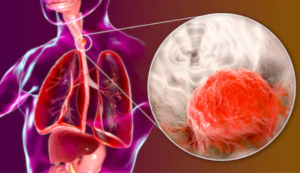If you’ve been hiccupping lately from esophageal cancer, would they be different from normal hiccups?
Esophageal cancer CAN cause hiccups, among other symptoms.
Though esophageal cancer can result in hiccups, this does not mean you should fear this disease every time you suddenly hiccup.
But there are things you should be aware of.
“Hiccups remain a poorly understood phenomenon with a wide variety of possible causes,” says Santosh Sanagapalli, MD, a consultant gastroenterologist, endoscopist and specialist in esophageal disorders.
“What we perceive as hiccups are due to involuntary, repetitive contractions of the diaphragm (the muscle that divides the chest and abdominal cavity which is involved with breathing).
“Acute hiccups (those lasting less than a day or two) are familiar to most people, typically are not overly distressing, and usually terminate on their own.
“For these reasons, they do not need any specific medical investigation or treatment.
“Hiccups lasting longer, especially a month or more, are sometimes referred to as intractable or persistent hiccups.
“Hiccups lasting this long are far less common.
“While in many cases of intractable hiccups a cause still may not be found (so-called ‘primary hiccups’), there is more commonly an association with diseases affecting the upper gastrointestinal tract or central nervous system (CNS).
“A multitude of causes can lead to hiccups by abnormalities of the reflex arc that produces them.”
Esophageal Cancer and Hiccups

Shutterstock/Kateryna Kon
“The reflex arc includes the vagus nerve, which carries signals to the brain,” says Dr. Sanagapalli.
“In the CNS, the upper spinal cord, brainstem and hypothalamus can all be involved in the production of hiccups, and from here signals are transmitted to the diaphragm via the phrenic nerve.
“Therefore, GI causes of hiccups include distension of the stomach (e.g., following consumption of fizzy drinks), GERD, esophageal cancer and hiatus hernia have all been linked to persistent hiccups.
“These are all thought to produce hiccups via abnormal stimulation of the vagus nerve.
“The most common CNS causes of hiccups include stroke, brain tumors and head injury.
“Anxiety and stress have also been implicated as the cause of hiccups in some persons.
“There is no evidence to suggest that the hiccups patients experience are any different based on the underlying cause.”
Unexplained Hiccups?
What are the odds that unexplained hiccups are from esophageal cancer?
If they’re your only symptom short-term, and you feel no problems with food going down your throat and beyond, they’re probably not from esophageal cancer.
However, Dr. Sanagapalli says this: “If a person is worried about unexplained hiccups, I would first reassure them that if they have lasted for less than 48h, then there is nothing to worry about.
“If the hiccups last longer than two days but less than a month, I would suggest consulting a physician IF there are any associated upper GI symptoms (e.g., trouble swallowing, new-onset of heartburn, weight loss) or neurological symptoms (e.g., limb weakness, blurred vision, loss of sensation, drowsiness).
“If the hiccups have lasted longer than a month, then I would suggest consulting a physician even if there are no other symptoms present, as further investigations would be warranted at that stage.”
 Dr. Sanagapalli is a gastroenterologist and director of the Esophageal Disorders Center at St Vincent’s Hospital, Darlinghurst. He performs diagnostic and therapeutic endoscopic procedures, and enjoys providing comprehensive and holistic care to patients with a wide variety of disorders affecting the gastrointestinal tract.
Dr. Sanagapalli is a gastroenterologist and director of the Esophageal Disorders Center at St Vincent’s Hospital, Darlinghurst. He performs diagnostic and therapeutic endoscopic procedures, and enjoys providing comprehensive and holistic care to patients with a wide variety of disorders affecting the gastrointestinal tract.
 Lorra Garrick has been covering medical, fitness and cybersecurity topics for many years, having written thousands of articles for print magazines and websites, including as a ghostwriter. She’s also a former ACE-certified personal trainer.
Lorra Garrick has been covering medical, fitness and cybersecurity topics for many years, having written thousands of articles for print magazines and websites, including as a ghostwriter. She’s also a former ACE-certified personal trainer.
.



























